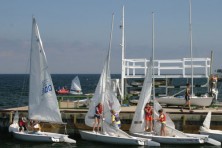Ephraim Yacht Club Prides Itself on Sailing Education
- Share
- Tweet
- Pin
- Share
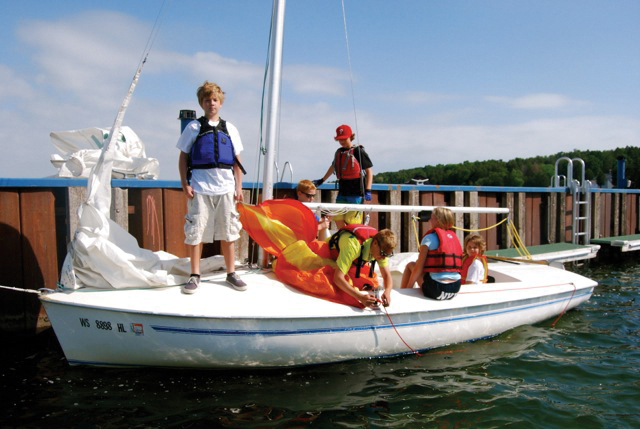
The words “yacht club” connote certain things such as old money and exclusivity, however the Ephraim Yacht Club prides itself on being just the opposite. If it had a motto, it might be “Sailing for everyone!”
“Since the early 1980s, there hasn’t been anything exclusive about the club. All you gotta do is walk in and fill out a form, and then you’re in,” said Jay Lott, who holds several titles with the club, including Rear Commodore and chair of the Education Committee. “It’s not like most yacht clubs where there’s a social exclusivity aspect to it. That’s what’s really great.”
The difference, Lott says, is that the club adopted a community sailing model.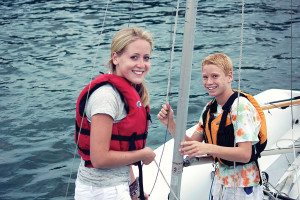
“We call ourselves a yacht club and no one proposed to change the name, but we are a community sailing center that owns boats,” he said.
Enthusiastic young sailors – many themselves graduates of the EYC sailing school – are hired every summer to teach their sailing skills to others, mostly children, but adults can also take lessons.
“The kids don’t have to convince their parents to buy them a boat,” Lott said. “If you go down to the yacht club, there are 60 boats on the pier. Fifty of them belong to the yacht club and kids can use them for free. There is no additional charge. It’s part of their tuition.”
The history of sailing lessons at the yacht club goes back to 1938, “but the people who were teaching between 1938 and 1964 used their own boats,” Lott said. “They didn’t have a hired instructor sailing program until 1964. Dick Straubel was the first guy. He conveniently owned a sailboat. Since the club didn’t have a boat, he was probably a preferred candidate because he brought a boat with him. He taught 39 students the first year in 1964, which is pretty many.”
The next year the club decided to hire an activities director, and for that position they hired Rich Hall, who Lott describes as the club’s “most legendary instructor.”
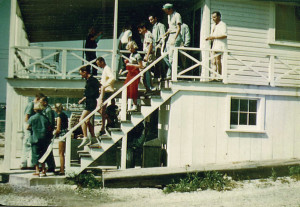
Photo submitted by Rich Hall.
He is also, Lott points out, the namesake of the EYC’s annual Rich Hall Junior Regatta.
“From 1953 or ‘54 up until ‘59, I was in high school and college,” Hall said, “and in the summers I was taking out tourists for sailboat rides from the Eagle Inn dock, right next to the yacht club, it’s now Eagle Harbor. I did sailing trips with an 18-foot Seagull my family had. I gave a few lessons, but it was mainly private and not associated with the yacht club at all.”
When he was asked to become the yacht club’s activities director for the summer of 1965, Hall had already begun his academic career as a philosophy professor at a small college in eastern Pennsylvania.
“As a young professional I was supposed to be doing research in the summer so I could publish papers, so it was a bit of a conflict,” Hall said by telephone from his Ohio home, “but on the other hand, I love sailing and teaching kids to sail. It was just a wonderful time, but I was torn.”
Hall said as activities director, he not only taught kids how to sail, but had a weekly activity night for them. By this time he was married and his wife, Prudy, assisted with the activities.
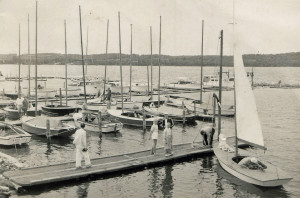
EYC in 1960. Photo submitted by Rich Hall.
“We had things like game night at the yacht club or late evening picnics, maybe on the Lake Michigan side of the peninsula. We had treasure or scavenger hunts. In general, that didn’t have much to do with sailing, but kept them interested in and around the club,” he said. “But there was a lot of teaching sailing and running races.”
With the help of EYC’s then-Commodore Volney “Bill” Wilson, whose day job was with General Electric in Schenectady, New York, an electronic race signal system was built so Hall would not have to stand on the dock to signal for the race.
“I wanted to be able to go out with kids when they were learning to race, to tell them the rules and racing tactics, but if I had to run the races from the end of the dock, which is where they were run from at that time, then I couldn’t be out on the boat,” he said. “I got Volney Wilson to build me an automatic race starting system, so I could flip a switch to start it and get out on a boat with a kid and give racing instructions and strategies. That worked well.”
Hall was hired again for the next summer, “and they gave me an assistant because there were so many kids who wanted to learn to sail,” he said.
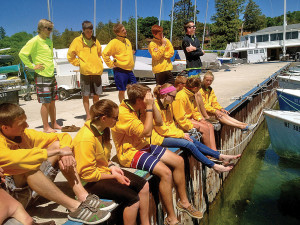 But after that, he had to concentrate on his academic career, until he got a call about 10 years later.
But after that, he had to concentrate on his academic career, until he got a call about 10 years later.
“One of the board of directors called and said, ‘Richie, the teaching of sailing has fallen off. Could you come back and get it going again. Maybe ’73, ’74, my wife and I, and we had two kids by then, came back. We did it for two summers, and got it going again. Since then it has just grown. More and more yacht club kids have wanted to learn how to sail, and they have increased the number of teaching assistants, something like 17 giving lessons in all sizes of boats and almost every day of the week.”
Lott said one of his favorite things to do in the winter is crunch yacht club sailing numbers.
“Measured in students, individual people we can teach in the summer, we’re not even close to reaching our capacity,” he said. “We taught a little more than 253 individual students last summer. We could have taught 400-plus. Last year we only filled 56 percent of our slots, and that was teaching 253 kids. So a lot of empty slots. We never had to turn anybody away.”
He has personally seen the tremendous sense of accomplishment the kids have when they grasp the sailing skills.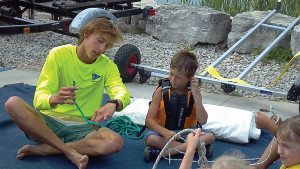
“It’s way more than I’ve ever seen with any other sport,” he said. “We emphasize to the parents, this is a lifetime skill. It’s like riding a bike. Because it’s a lifetime sport, it’s something you can do intergenerationally. That’s something we’re particularly strong at, the intergenerational aspect of sailing. Parents and kids sailing together are common. It’s very common for people who are not related but 30 years apart to sail.
“I have a Flying Scot I race at the club, but I didn’t have a crew. I’d go down to the club either the day before or the day of the race and say, ‘I need a crew,’ and I’d get some of the staff or some kids in their younger teens sailing with me on the boat. They liked it, and I got a crew that wasn’t too heavy, and the kids learn something. But they also learn that someone 30 years older than you is still a person. You can do something on the same level as them. That’s a huge confidence builder for them.
“Kids 11 years old skippering, and they beat me, not always, but sometimes. What a cool feeling that is for them. ‘Hey, mom, I beat the Commodore, the guy that always wins.’”
Photos submitted by the EYC.


